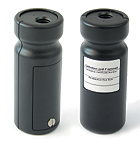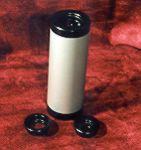521 Sound Level Calibrator
Specifications and Accessories 
- 1000 Hz +/- 1%
- Distortion Less than 2% THD
- 0 dB Reference Point for: A, B, C, D Weighting
- 94 dBSPL = 1 Pa
- Accuracy - Meets IEC60942:2003 Class 1
- +/-0.3 dB @ 23 C°
- +/-0.5 dB 0 to 50 C°
- Power 9Vdc Alkaline Battery 6F22 (NEDA 1604A)
- Cavity Diameter 0.525 Inch
- Effective Volume 6.19 cm3+/- 0.2 cm3
- 1/2 inch microphone compatible
- Weight w/battery 185g
- Dimensions 135mm x 048mm
- Operating Temperature - 10C to +50C
- Storage Temperature - 20C to +60C
- Operating Statuc Pressure 65 kPa to 108 kPa
- Operating Humidity 25 to 90%
Why 1 kHz as a test frequency?
Accepted internationally 1 kHz represents the "0 dB" reference point of A, B, C Weighting and other filters utilized in acoustic measurement. The Pistonphone - a mechanical sound source - offers a slightly higher degree of accuracy at a substantial increase in cost. In addition, the 200 or 250 Hz operating frequency is mechanically limited and not suited for measurements of filtered inputs. The 0.2 dB accuracy is quickly lost in the 0.7 to 1.5 dB tolerances acceptable for weighting filters at frequencies around 250 Hz.
Why 94 dBSPL?
International standards have established 1 Pascal (Pa) as 94 dBSPL. This reference point is now accepted for specifying the sensitivity of microphones. The uBar found in some specifications refers to 74 dBSPL (20 dB less than 1 Pa).
SPECIAL ORDER CALIBRATORS:
511E Sound Level Calibrator
 Specifications and Accessories
Specifications and Accessories
- 1000 Hz
- 0 dB Reference Point for: A, B, C, D Weighting
- 2 Output Levels - Permits Range testing
- 94 dBSPL = 1 Pa
- 104 dBSPL
- Accuracy - Meets IEC942
- +/-0.3 dB @ 23 C° Type 1L
- +/-0.5 dB 0 to 50 C°
- Power 9Vdc Alkaline Battery (NEDA 1604A)
- Diameter 1 1/8 inches
- 1/2 inch adaptor Q3 (Included with 511E )
- Adaptors - Optional
- Q1 - 1 inch
- Q2 - 20 mm
- Q3 ( Supplied with 511E) - 1/2 inch
- Q4 - 10mm
- Q7 - 1/4 inch
Why 1 kHz as a test frequency?
Accepted internationally 1 kHz represents the "0 dB" reference point of A, B, C Weighting and other filters utilized in acoustic measurement. The Pistonphone - a mechanical sound source - offers a slightly higher degree of accuracy at a substantial increase in cost. In addition, the 200 or 250 Hz operating frequency is mechanically limited and not suited for measurements of filtered inputs. The 0.2 dB accuracy is quickly lost in the 0.7 to 1.5 dB tolerances acceptable for weighting filters at frequencies around 250 Hz.
Why 94 dBSPL?
International standards have established 1 Pascal (Pa) as 94 dBSPL. This reference point is now accepted for specifying the sensitivity of microphones. The uBar found in some specifications refers to 74 dBSPL (20 dB less than 1 Pa).
SPECIAL ORDER CALIBRATORS:
511ES124 SPL Calibrator -
124 dBSPL @ 1 kHz
The 511ES124 is designed to provide 124 dBSPL at 1 kHz to meet the needs of the low sensitivity microphones found in many high SPL measurement applications. The microphones used in Car Stereo competitions like dB Drag racing, IASCA, and USAC have had their sensitivities reduced to the point where 94 dBSPL may no longer be adequate for calibration.
The more expensive Pistonphone while providing 124 dBSPL does so at 250 Hz. The 511ES124 provides both 124 dBSPL and also 94 dBSPL (1 Pascal) at 1 kHz, the "0" reference frequency of "A" weighted other filters. A Type 1 "A" weighted curve has a tolerance of +/- 1.0 dB. So much for the pistonphone accuracy. The low (1% THD) distortion also permits distortion measurements of many conventional microphones.
The 511ES124 is manufactured and calibrated to and meets the same standards of the 511E. Two levels are provided. 124 dBSPL and 94 dBSPL (1 Pa). Even at 124 dBSPL the 511ES124 has less than 1% THD, making it perfect for check the distortion of other microphones.
Custom versions of the 511E are available. Past model options have included 64 dBSPL and 84 dBSPL versions. Please contact the factory for details and pricing.